牛津小学英语六年级英语6B知识点汇总
牛津小学英语6BUnit6知识点归纳

牛津小学英语6B Unit6知识点归纳一、重要词组:1. have school上课;有课2.have a picnic野餐3. I’d love to 我很愿意…4.go on an outing去远足5. by the way顺便地;附带说说6.see a play看戏剧演出7. see a Beijing opera 看京剧8.of course当然9. on Saturday morning在周六上午10. call sb. 打电话给某人11. warm and sunny温暖晴朗12. join us加入我们13. watch the snow 观雪14. take part in the sports meeting参加运动会15. by the window 在窗户那儿,靠着窗户16. make a plan 制定计划17. class project 班级课题18. have a class outing举行班级远足19. their plans for the weekend 他们的周末计划20. meet at one thirty in front of the Garden Theatre 一点半在花园剧院门前会面21. buy some presents买一些礼物22. at the concert 在音乐会上23. come with Wang Bing 和王宾一起来24. tomorrow afternoon 明天下午25. give/ have a concert举行音乐会26. a singing contest 歌咏比赛27. give a puppet show举行木偶演出28. a new zebra from Africa 来自非洲的新斑马29.meet at the bus stop at 10:30 10:30在公交车站会面30. the girl with the yellow bowl 端着黄碗的女孩二、句型:1. 一般将来时be going to (表示“打算、将要、准备去做某事”)询问“某人打算干什么”及其应答:----What are we/you going to do? ----We’re/I’m going to+动词原形/地点+时间---What are you going to do at 10:15 tomorrow morning? ----I’m going to …----What is he/she/Liu Tao going to do? ----He/She is going to…----What are Liu Tao and Tom going to do? ----They are going to…其它特殊疑问句:----Where are you going? ----I’m going to Hongmei Park.----What time are you doing to come home? ----At 4:30, I think.----When are they going to meet? ----They’re going to meet at 1:30.Will 近似于be going to, 但在具体使用的时候意义上还是有所不同的。
上海牛津英语六年级第二学期6B英语知识点归纳U1~U9

六年级第二学期牛津英语知识点梳理Unit One Great cities in Asia打*的知识点仅供参考知识点梳理:I 词组1. at an exhibition 在展览会上2. the capital of China 中国的首都3. north-east of Shanghai 在上海东北面east/ west/ south / north of 在……的东、西、南、北面north-east /north-west of 在……的东北、西北south-east /south- west of 在……东南,西南* in/on/to the east ofeg. Shanghai is in the east of China.Korea is on the east of China.Japan is to the east of China.3. how far 多远4. how 如何/怎样5. how long 多久6. in the past 在过去7. other places 其他城市8. from shanghai to Beijing 从上海到北京9. read some information about Beijing 阅读关于北京的信息10. the Great Wall 长城* the Summer Palace 颐和园* the Palace Museum 故宫博物院11. more than= over 超过* less than = under 少于12. 15 million people 一千五百万人*millions of, thousands of13. huge department store 大型百货公司*huge= very big14. spicy food 辣的食物15. in Asia 在亚洲16. great cities= big cities 大城市17. which city 哪个城市18. by plane=by air; 乘飞机by ship=by sea; 乘船by train/ ferry 乘火车/ 渡轮19. That’s right. 对的。
牛津小学英语六年级6B知识点汇总
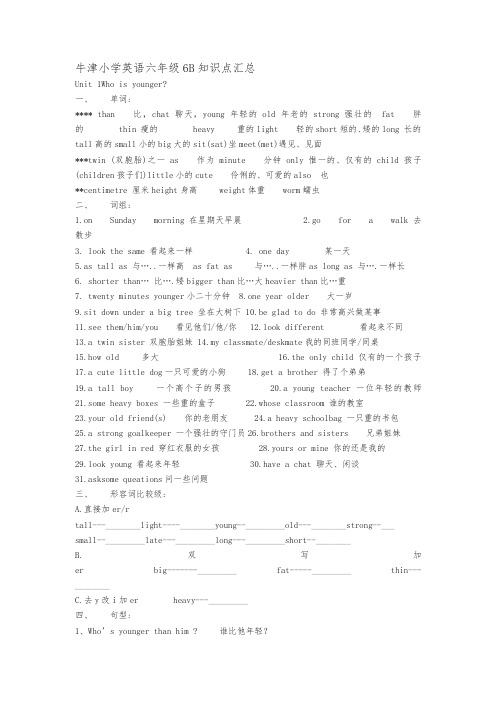
牛津小学英语六年级6B知识点汇总Unit 1Who is younger?一、单词:**** than 比,chat聊天,young年轻的old年老的strong 强壮的fat 胖的thin 瘦的heavy 重的light 轻的short短的、矮的long 长的tall高的small小的big大的sit(sat)坐meet(met)遇见、见面***twin (双胞胎)之一as 作为minute 分钟only惟一的、仅有的child孩子(children孩子们)little小的cute 伶俐的、可爱的also 也**centimetre 厘米height身高 weight体重worm蠕虫二、词组:1.on Sunday morning 在星期天早晨2.go for a walk 去散步3. look the same 看起来一样4. one day 某一天5.as tall as 与…..一样高as fat as 与…..一样胖as long as 与….一样长6. shorter than…比….矮bigger than比…大heavier than比…重7. twenty minutes younger小二十分钟 8.one year older 大一岁9.sit down under a big tree 坐在大树下 10.be glad to do 非常高兴做某事11.see them/him/you 看见他们/他/你 12.look different 看起来不同13.a twin sister 双胞胎姐妹 14.my classmate/deskmate我的同班同学/同桌15.how old 多大16.the only child 仅有的一个孩子17.a cute little dog一只可爱的小狗 18.get a brother 得了个弟弟19.a tall boy 一个高个子的男孩 20.a young teacher 一位年轻的教师21.some heavy boxes 一些重的盒子 22.whose classroom 谁的教室23.your old friend(s) 你的老朋友 24.a heavy schoolbag 一只重的书包25.a strong goalkeeper 一个强壮的守门员26.brothers and sisters 兄弟姐妹27.the girl in red 穿红衣服的女孩 28.yours or mine 你的还是我的29.look young 看起来年轻 30.have a chat 聊天、闲谈31.asksome queations问一些问题三、形容词比较级:A.直接加er/rtall---________light----________young--_________old---________strong--___ small--_________late---_________long---_________short--________B.双写加er big-------_________ fat-----_________ thin---________C.去y改i加er heavy---_________四、句型:1、Who’s younger than him ?谁比他年轻?My brother is younger than him . 我弟弟比他年轻。
牛津小学英语6B▲必背词汇、短语、句型_2
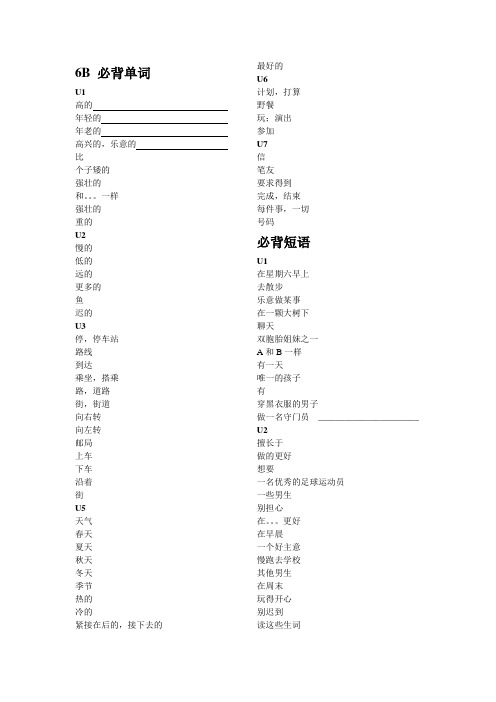
6B 必背单词U1高的年轻的年老的高兴的,乐意的比_________________________________ 个子矮的___________________________ 强壮的_____________________________ 和。
一样_________________________ 强壮的_____________________________ 重的_______________________________ U2慢的_______________________________ 低的_______________________________ 远的_______________________________ 更多的_____________________________ 鱼_________________________________ 迟的_______________________________ U3停,停车站_________________________ 路线______________________________ 到达_______________________________ 乘坐,搭乘_________________________ 路,道路___________________________ 街,街道___________________________ 向右转_____________________________ 向左转_____________________________ 邮局_______________________________ 上车_______________________________ 下车_______________________________ 沿着_______________________________ 街_________________________________ U5天气_______________________________ 春天_______________________________ 夏天_______________________________ 秋天_______________________________ 冬天_______________________________ 季节_______________________________ 热的_______________________________ 冷的_______________________________ 紧接在后的,接下去的_______________ 最好的____________________________U6计划,打算________________________野餐______________________________ 玩;演出__________________________参加______________________________U7信________________________________笔友______________________________要求得到__________________________完成,结束________________________每件事,一切______________________号码______________________________ 必背短语U1在星期六早上_________________________ 去散步_______________________________ 乐意做某事___________________________ 在一颗大树下_________________________ 聊天_________________________________ 双胞胎姐妹之一_______________________ A和B一样___________________________ 有一天_______________________________ 唯一的孩子___________________________ 有___________________________________ 穿黑衣服的男子_______________________ 做一名守门员_________________________ U2擅长于_______________________________ 做的更好_____________________________ 想要_________________________________ 一名优秀的足球运动员_________________ 一些男生_____________________________ 别担心_______________________________ 在。
牛津小学英语六年级英语6B语法汇总
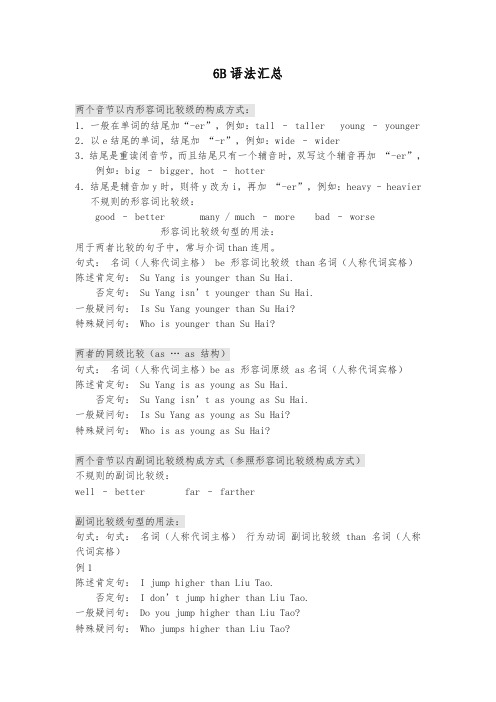
6B语法汇总两个音节以内形容词比较级的构成方式:1.一般在单词的结尾加“-er”,例如:tall – taller young – younger 2.以e结尾的单词,结尾加“-r”,例如:wide – wider3.结尾是重读闭音节,而且结尾只有一个辅音时,双写这个辅音再加“-er”,例如:big – bigger, hot – hotter4.结尾是辅音加y时,则将y改为i,再加“-er”,例如:heavy –heavier 不规则的形容词比较级:good – better many / much – more bad – worse形容词比较级句型的用法:用于两者比较的句子中,常与介词than连用。
句式:名词(人称代词主格) be 形容词比较级 than名词(人称代词宾格)陈述肯定句: Su Yang is younger than Su Hai.否定句:Su Yang isn’t younger than Su Hai.一般疑问句: Is Su Yang younger than Su Hai?特殊疑问句: Who is younger than Su Hai?两者的同级比较(as … as 结构)句式:名词(人称代词主格)be as 形容词原级 as名词(人称代词宾格)陈述肯定句: Su Yang is as young as Su Hai.否定句:Su Yang isn’t as young as Su Hai.一般疑问句: Is Su Yang as young as Su Hai?特殊疑问句: Who is as young as Su Hai?两个音节以内副词比较级构成方式(参照形容词比较级构成方式)不规则的副词比较级:well – better far – farther副词比较级句型的用法:句式:句式:名词(人称代词主格)行为动词副词比较级 than名词(人称代词宾格)例1陈述肯定句: I jump higher than Liu Tao.否定句:I don’t jump higher than Liu Tao.一般疑问句: Do you jump higher than Liu Tao?特殊疑问句: Who jumps higher than Liu Tao?例2陈述肯定句: Liu Tao runs faster than me.否定句:Liu Tao doesn’t run faster than me.一般疑问句: Does Liu Tao run faster than you?特殊疑问句: Who runs faster than you?be going to (do sth.) 打算做某事1)表示现在的意图,即打算在最近或将来进行某事,例如:We are going to post the letter.2)表示现在已有迹象表明将要发生或即将发生某种事态,例如:I must hurry, I’m going to be late.(常与tomorrow, next week, next year等将来时间连用)用法:陈述肯定句:We are going to give a puppet show next week.否定句:We aren’t going to give a puppet show next week.一般疑问句:Are you going to give a puppet show next week? 特殊疑问句:Who is going to give a puppet show next week?What are you going to do next week?。
译林牛津小学六年级英语6BU4知识点

六年级英语各单元知识点概括Unit 4 Road safety一、词组概括Story time1.many busy roads 很多忙碌的街道2. look for a zebra crossing找寻一个斑马线3. look out for cars小心车辆4. road safety马路安全5. look at the traffic lights看交通灯6.cross them safely安全地穿过它们7.on the road在马路上8. to keep safe为了保持安全9.wait for the green man等候绿灯10.mustn’t cross the road严禁穿过马路 11. look left/right向左/ 右看12.the right side of the road马路的右边13. with other people和其余人一同14.on the pavement 在人行道上15. see you easily简单看到你16.follow the rules恪守规则17.stay safe保持安全18. in the city在城市里Fun time, Sound time,Culture time﹠ Cartoon time19. must look for a zebra crossing一定找寻一条斑马线20. wait for the bus等候公交车21. wait for me等我22. find a zebra crossing找到一条斑马线23. mustn ’t run quickly 绝不可以迅速地跑步24. mustn ’t walk 绝不可以行走25. the left side of the road马路的左侧26. drive on the right side of the road马路的右边驾驶27. except me除了我28. except Macau除了澳门29. go to see their aunt去看他们的阿姨30. take the bus搭车31. get on /off the bus上车/ 下车32. so many cars 这样多的车33. so much water这样多的水34. go fast快点去35. a red light一个红灯36. look at the green light看绿灯 37. at the bus stop在公交车站38. must stop一定停下来39. go on持续,持续行进40. go to see the doctor去看医生41. you ’re sick你患病了42. classroom rules班级规则43. talk loudly高声地讨论44. keep your desk clean保持桌子洁净45. listen to your teachers in class在讲堂上听老师讲二、要点句型1.A: How can you cross the road safely?你怎样安全地过马路?B: I must look for a zebra crossing.我一定找寻一条斑马线。
牛津小学英语6B第三单元知识点整理

牛津小学英语6B第三单元知识点整理一、本课单词、会听写、默写。
1.way路线2.get到达3.along沿着4.street街,街道5.take乘坐,搭乘(交通工具)6.stop停车站7.road 路,道路 8.crossing十字路口 left左,左边9.right右,右边 10.bookshop 书店 11.history历史 12.museum博物馆 13.miss没找到,错过 kilometre千米14.No. (number 的缩写,用于数字前)…号15.steal偷(过去式stolen) 16.shout呼喊,喊叫17.thief贼 18.hotel旅馆19.place地方,地点动词和它们的过去式: come-cametell-told run-rantake-took二、熟记本课词组、会听写部分重要词组。
1.ask the way 问路 show the way 指路 get there 到达那儿get to the History Museum到达历史博物馆2.go along this street 沿着这条街道走3.take bus No. 5. 乘5路公交车 take a bus 坐公共汽车at the third stop 在第3个停靠站 on Beijing Road 在北京路in Beijing Street 在北京街4.a bus stop 一个公交车站5.at the third crossing 在第三个十字路口6 three kilometres 3公里 7.get on 上车 get off 下车8.turn left 向左转 turn right 向右转 9.on (my) left 在我的左边10.on (my) right 在我的右边e from Australia 来自澳大利亚12.live in Nanjing 居住在南京13.want to visit the park 想要参观公园14.how to get there 怎样去那里a map of the town/city/country一张城镇/城市/国家的地图buy some presents买些礼物15.a post office 一个邮局 16.a shopping center一个购物中心17.a middle school 一所中学 18.a primary school一所小学19.a train station 一个火车站 21. every five minutes每五分钟22.run (ran) out of the shop 跑出商店 out of 在…的外面23.run (ran) faster than me 比我跑得快24.pick a card 挑一张卡片 last Saturday afternoon 上周六下午buy a book about animals 买一本关于动物的书follow him 跟着他start/begin to do sth. 开始做…… come to help 过来帮忙25.steal my purse 偷我的钱包26.follow him along the street 沿着这条街跟着他27.stop the thief 拦住了小偷28.get my purse back 拿回了钱包29.the Bank of China 中国银行三、句型A.Excuse me , can you tell me the way to …,please ?例:1.Excuse me , can you tell me the way to the History Museum, please?打扰一下,你能告诉我去历史博物馆的路吗?B.Go along this street, and then turn …at the …crossing . 例:2.Go along this street ,and then turn left at the second crossing.沿着这条街走,然后在第二个十字路口向左拐。
牛津小学英语6B知识点
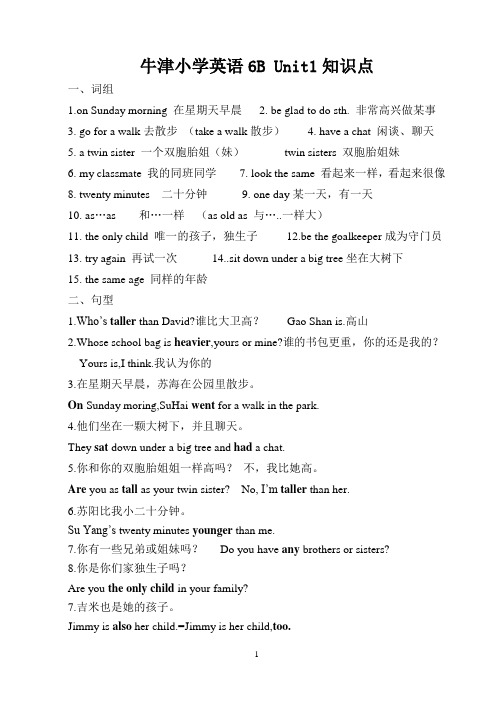
一、词组1.on Sunday morning 在星期天早晨2. be glad to do sth. 非常高兴做某事3. go for a walk去散步(take a walk散步)4. have a chat 闲谈、聊天5. a twin sister 一个双胞胎姐(妹)twin sisters 双胞胎姐妹6. my classmate 我的同班同学7. look the same 看起来一样,看起来很像8. twenty minutes 二十分钟9. one day某一天,有一天10. as…as 和…一样(as old as 与…..一样大)11. the only child 唯一的孩子,独生子12.be the goalkeeper成为守门员13. try again 再试一次14..sit down under a big tree坐在大树下15. the same age 同样的年龄二、句型1.Who’s taller than David?谁比大卫高?Gao Shan is.高山2.Whose school bag is heavier,yours or mine?谁的书包更重,你的还是我的?Yours is,I think.我认为你的3.在星期天早晨,苏海在公园里散步。
On Sunday moring,SuHai went for a walk in the park.4.他们坐在一颗大树下,并且聊天。
They sat down under a big tree and had a chat.5.你和你的双胞胎姐姐一样高吗?不,我比她高。
Are you as tall as your twin sister? No, I’m taller than her.6.苏阳比我小二十分钟。
Su Yang’s twenty minutes younger than me.7.你有一些兄弟或姐妹吗?Do you have any brothers or sisters?8.你是你们家独生子吗?Are you the only child in your family?7.吉米也是她的孩子。
牛津小学英语6B第二单元知识点归纳与要求
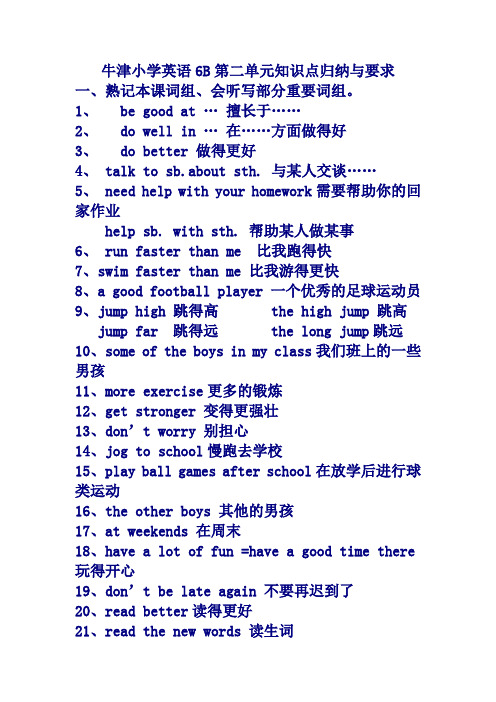
牛津小学英语6B第二单元知识点归纳与要求一、熟记本课词组、会听写部分重要词组。
1、be good at … 擅长于……2、do well in … 在……方面做得好3、 do better 做得更好4、 talk to sb.about sth. 与某人交谈……5、 need help with your homework需要帮助你的回家作业help sb. with sth. 帮助某人做某事6、 run faster than me 比我跑得快7、swim faster than me 比我游得更快8、a good football player 一个优秀的足球运动员9、jump high 跳得高 the high jump 跳高 jump far 跳得远 the long jump跳远10、some of the boys in my class我们班上的一些男孩11、more exercise更多的锻炼12、get stronger 变得更强壮13、don’t worry 别担心14、jog to school慢跑去学校15、play ball games after school在放学后进行球类运动16、the other boys 其他的男孩17、at weekends 在周末18、have a lot of fun =have a good time there 玩得开心19、don’t be late again 不要再迟到了20、read better读得更好21、read the new words 读生词22、start/begin our lesson 开始上课23、all of us/them 他们/我们所有人24、well done 做得好25、remember them记住他们26、animals show 动物表演28、around the lake 绕着湖29、in red and white short 穿红白相间的短裤30、different sports 不同的运动31、well done=good jib 干得好。
牛津小学英语6BUnit 5 The seasons知识点及练习

Unit 5 The seasons知识点第一部分、音标:season/`si:zn/ spring/spr Iŋ/summer/`s۸mə/ autumn/`כ:təm/winter/`w I ntə/ weather/`weðə/ next/nekst/ best /best/第二部分、词组:1.go to New York 去纽约2.next season/week/year/month 下一个季节/周/年/月3.work there for one year 在那里工作一年4.weather in New York纽约的天气5.want to know about the weather there 想知道那里的天气6 ask some questions about 问有关……的问题.7. in spring/summer/autumn/winter在春季/夏季/秋季/冬季8. as hot as in Nanjing和南京一样热9. the best season 最好的季节10. go to farms去农场11. in the countryside 在乡下12. pick apples/pears/grapes/bananas/oranges/mangoes/ 摘苹果/……13. Sounds great ! 听起来太棒了!14. most of the time 大部分时间15. make snowmen/make a snowman 堆雪人16. colder than in Nanjing比南京冷17.need some warm clothes 需要一些保暖的衣服18.a lot of (lots of)rain/snow许多雨/雪19. turn green (指植物)变绿20. go rowing去划船go fishing去钓鱼go swimming去游泳go climbing去爬山go walking=go for a walk去散步go jogging去慢跑go skating去滑冰go skiing去滑雪go running去跑步go camping 去野营21. get longer/shorter变得更长/更短22.stay at home待在家23.wait for spring等待春天24.swim a lot 经常游泳第三部分、句型----Which season do you like best? 你最喜欢哪个季节?----I like …(best). 我最喜欢…----Why? 为什么?----Because it’s … I can … 因为天气…我能…----What’s the weather like there in spring?在那里春天天气怎么样?----It’s (usually) …Sometimes it’s … 天气(通常)…有时…Wh at’s the weather like today?(同义句:How is the weather today?)今天天气怎么样?It’s usually very hot, as hot as in Nanjing.天气通常很热,和南京一样热。
牛津6BUnit6-unit10知识点梳理
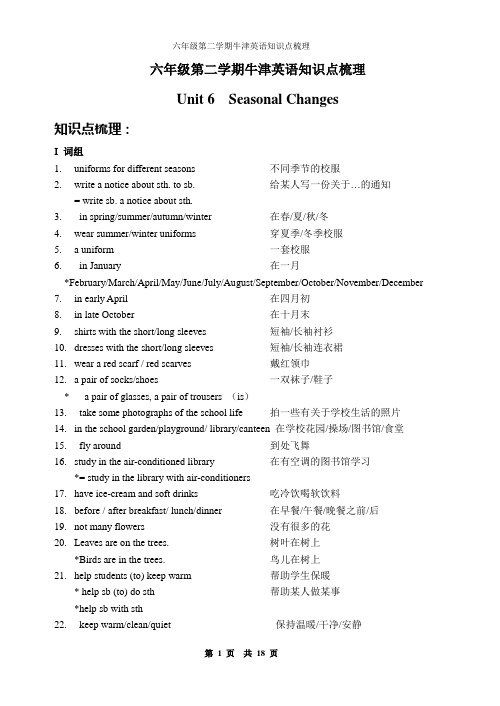
六年级第二学期牛津英语知识点梳理Unit 6 Seasonal Changes知识点梳理:I 词组1.uniforms for different seasons 不同季节的校服2.write a notice about sth. to sb. 给某人写一份关于…的通知= write sb. a notice about sth.3.in spring/summer/autumn/winter 在春/夏/秋/冬4.wear summer/winter uniforms 穿夏季/冬季校服5. a uniform 一套校服6.in January 在一月*February/March/April/May/June/July/August/September/October/November/December7.in early April 在四月初8.in late October 在十月末9.shirts with the short/long sleeves 短袖/长袖衬衫10.dresses with the short/long sleeves 短袖/长袖连衣裙11.wear a red scarf / red scarves 戴红领巾12. a pair of socks/shoes 一双袜子/鞋子* a pair of glasses, a pair of trousers (is)13.take some photographs of the school life 拍一些有关于学校生活的照片14.in the school garden/playground/ library/canteen 在学校花园/操场/图书馆/食堂15.fly around 到处飞舞16.study in the air-conditioned library 在有空调的图书馆学习*= study in the library with air-conditioners17.have ice-cream and soft drinks 吃冷饮喝软饮料18.before / after breakfast/ lunch/dinner 在早餐/午餐/晚餐之前/后19.not many flowers 没有很多的花20.Leaves are on the trees. 树叶在树上*Birds are in the trees. 鸟儿在树上21.help students (to) keep warm 帮助学生保暖* help sb (to) do sth 帮助某人做某事*help sb with sth22.keep warm/clean/quiet 保持温暖/干净/安静23.make snowmen (a snowman)堆雪人II. 词性转换1. seasonal (adj.) -- season (n.)There are four seasons in a year.Strawberries are seasonal fruit.2. change ( n. v. ) -- *changeable (adj.)Please change the sentence into English.Here is your change, sir.The weather is very changeable in Tibet.3. shorts ( n.)--short ( adj.)Boys must wear shorts and T-shirts in summer.In summer, the days are long and the nights are short.可数:*生命save my life *lives (pl.)4. life n.不可数:生活school lifelive (v.)*living adj. (定语) *alive adj. (表语)The farmer and his wife live happily in their hut and they enjoy their happy life very much.The hero who has saved his life is still alive.5. air-conditioned (adj.) air-conditioner (n.)The library isn’t air-conditioned now because there is something wrong with the air-conditioner.III. 语言点/句型1. Boys must wear white shirts with the short sleeves.2. Many flowers grow in the garden.3. Not many students like playing in the playground because it’s hot.Unit 7 Travelling in Garden City知识点梳理:I 词组:1.traveling in Garden City 花园城的出行2.travelling by bus∕ferry∕underground 乘公共汽车/渡船/地铁出行3. a single-decker bus 一辆单层汽车4. a double-decker bus 一辆双层汽车5. a fare box 一个投币箱6. a public transportation card 一张公共交通卡7.an air-conditioned bus 一辆空调车8.in the past 在过去9.in 10 years’ time 十年后10.all passengers 所有的乘客11.buy tickets from 从……买票12.collect money from the passengers 从乘客那里收钱13.have to do sth.(don’t have to do sth.) 不得不;必须(不必)14.put their money in a fare box 把钱放进投币箱e sth. instead 用……替代16.all of 全部的……17.most of 大部分的……18.some of 一些……19.none of 没有一个……20.be like 像……21.fewer traffic jams 少一些交通阻塞22.more underground stations 更多的地铁站23.light rail 轻轨24.traffic lights 交通灯25.car parks 停车场26.discuss sth. with sb. 和…讨论27.*think about 考虑;思考;想一想28.*kinds of transport 交通方式29.*make a poster about 制作一张有关……的海报II. 词性转换1. travel v. 旅行—travelling n. 交通—﹡traveller n. 旅行者e.g. Travelling in Shanghai will be more and more convenient.The Bund attracts many travelers to take photos there.2. conductor n. 售票员—*conduct v. 指挥,进行e.g. The manager asked him to conduct the meeting3. collect v. 收集—collection n. 收集e.g. Mr. Grey is interested in art and he has a large collection of paintings.4. driver n. 司机—drive v. 驾驶e.g. My father drives me to school every day.5. crossing n. 十字路口—cross v. 穿过—across prep. 越过e.g. Don’t cross the road when the traffic light is red.The old lady was walking across the road carefully.6. discuss v. 讨论—discussion n. 讨论e.g. We had a discussion on language and communication7. air-conditioned adj. 有空调设备的—air-conditioner n. 空调e.g. He's going to install an air-conditioner in the house.8. park v. 停车—park n. 公园/停车库e.g. I have to look for a car park to park my car.9. little adj. 很少的—less (比较级) 更少的e.g. He promised to have less fast food to keep healthy.10. few adj. 很少的—fewer (比较级) 更少的e.g. Helen made a few mistakes in her test paper. But Jane made fewer than her.11. many ∕much adj. 许多的—more (比较级) 更多的e.g. Nowadays you can find more tall buildings in Shanghai.III. 语言点/句型1. What will travelling in our city be like in 10 years’ time?=How will travelling in our city be in 10 years’ time?What …be like? …怎么样?be like∕look like 中like prep. 像…一样e.g. Our school is like a garden. like prep. 像…一样She looks like her mother.He likes reading detective stories, like v. 喜欢2. in 10 year s’ time =in 10 years 十年后(常与一般将来时连用)◆in one year’s time◆用How soon 提问e.g. The young man will finish riding around the country in two years’ time.How soon will the young man finish riding around the country?3. there be 句型表示事物的存在在什么地方有什么一般现在时:There is∕are一般过去时:There was∕were一般将来时:There will be/ There is going to be4. all of∕most of∕some of∕none of◆all of∕most of∕some of做主语时,后面的名词为复数,谓语动词也为复数e.g. All of the students wear school uniforms.◆none of做主语时,既可用复数谓语动词,也可用单数谓语动词e.g. None of us enjoy(s) getting up early.﹡复习one of的用法﹡可补充与both of∕either of∕neither of 的比较5. in the past∕nowadays∕in 10 years’ time分别与一般过去时,一般现在时,一般将来时连用e.g. In the past, people usually went to work by bike.Nowadays, people go to work by underground.In 10 years’ time, people will drive to work themselves.6. 比较级:little—less, few—fewer, many∕much—more◆fewer traffic jams∕less traffic7. have to do 不得不◆否定形式:don’t have to do = needn’t do∕don’t need to do 不需要e.g. I have to stay at home. I don’t have to stay at home.◆和must 的区别have to do —强调客观的需要,有人称,时态的变化must —强调主观的意愿,没有人称,时态的变化e.g. He broke his leg, so he had to lie in bed for several days.She must study hard, because she wants to be a doctor.8. perhaps= maybe, possibly 也许,可能9. travel by bus=take a bustravel by underground= take the underground10. instead和instead of◆instead单独用于句首句尾,是副词◆instead of 用于名词,代词或介词短语前e.g. I don’t like the red one, give me the black one instead.= Give me the black one instead of the red one.11. transportation n. (美)= transport n.(英)交通工具12. 动词与介词的搭配buy … from从…买collect … from从…收集put … in把…放入13. a woman driver— five wom e n driver sa man teacher— two m e n teacher s*a girl student — some girl studentsUnit 8 Windy weatherI 词组1.windy weather 有风的天气2.different kinds of 不同种类的3.make a display board 制作一个展板4. a gentle wind 一阵柔和的风5. a strong wind 一阵大风6. a typhoon 一阵台风7.see sb. doing sth 看见某人正做某事8.fly kites in the park 在公园里放风筝9.hold raincoats tightly 紧紧地抓住雨衣10.leaves blow slightly 树叶微微地吹动11.fly in the sky 在空中飞扬12.take flower pots into flats 把花盆拿进房间13.clouds move quickly 云快速地移动14.windsurf on the sea 在海上进行帆板运动15.on a windy day 在一个有风的日子16.fly kites happily 快乐地放风筝17.at first 起先18.blow gently 柔和地吹19.move slowly 缓慢地移动20.become stronger (风)变得更大了21.blow sth. away 吹走某物22.go home immediately 立刻回家23.blow fiercely 猛烈地吹24.fall down 倒下25.sink in the sea 在海里下沉26.pass quickly 快速地经过27.walk carefully in the street 街上小心地行走28.clean the street 清扫街道29.a slide show about typhoons 一个关于台风的幻灯片30.heavy objects 重物31.fall on cars 落在小汽车上32.break windows 打破玻璃窗33.flower pots outside people’s flats 人们屋外的花盆34.big waves in the sea 海里的大浪35.think about 思考;考虑36.may happen 可能发生37.when there is a typhoon 当有台风的时候38.sink ships and boats 沉没船只39.safety rules 安全规则40.stay at home 待在家中41.close all the windows 关闭所有的窗42.park cars in car parks把汽车停在停车场里43.fishing boats 渔船44.stay in typhoon shelters 待在台风庇护所里II. 词性转换1. windy a. 有风的wind n. 风windy weather/ days a gentle/ strong wind2. gentle a. 温和的gently ad. 温和地He is a gentle person.She gave me a gentle push.3. tightly ad. 紧紧地tight a. 紧紧的She kept her eyes tightly closed.You must hold the bottle tightly.4. slightly ad. 轻微地slight a. 轻微的The leaves blow slightly in the parksI know about him slightly.5. cleaner n. 清洁工人clean a. 干净的v. 清洁They saw some street cleaners cleaning the street.6. happily ad. 愉快地happy a. 快乐的happiness n. 快乐Kitty and Ben flew their kite happily.John lives happily because he always uses his time well for study.7. slowly ad. 缓慢地slow a. 缓慢的The clouds moved slowlyThe sky changed slowly from blue to red.反义quickly/ fast ad. 迅速地8. quickly ad. 迅速地quick a. 迅速的The clouds moved quickly.9. immediately ad. 立即immediate a. 立即的Kitty and Ben went home immediately.Stop smoking immediately.10. fiercely ad. 猛烈地fierce a. 猛烈的The wind became a typhoon and blew fiercely.11. carefully ad. 小心地careful a. 小心的,仔细的*care n./ v. 关心Please listen carefully and write down the sentences.反义carelessly ad. 不注意地,粗心地12. heavy a. 沉重的heavily ad. 沉重地13. safety n. 安全safe a. 安全的*safely ad. 安全地safety rulesmake our city a safe placearrive at home safely14. inside(反义)—outside15. fish n. 鱼v. 捕鱼fisherman ( fishermen) n.(复数) 渔民III. 语言点/句型1. What can you see when there is a gentle wind?有微风的日子里你能看到些什么?when,连词,意为―当……时‖ ,引导时间状语从句。
牛津英语6B6要点
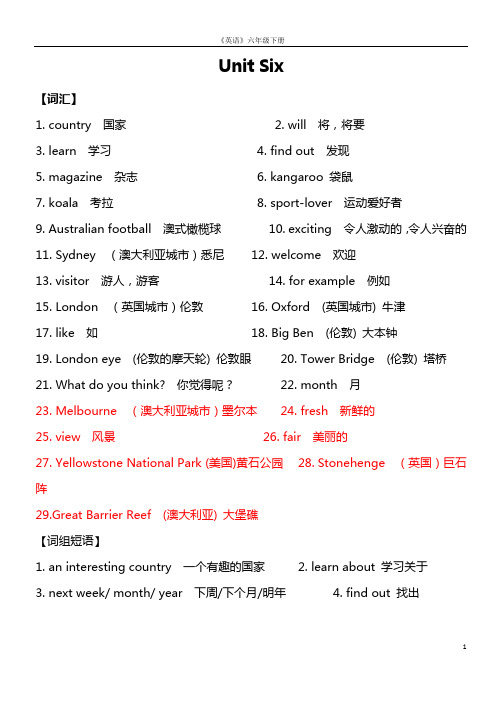
Unit Six【词汇】1. country 国家2. will 将,将要3. learn 学习4. find out 发现5. magazine 杂志6. kangaroo 袋鼠7. koala 考拉8. sport-lover 运动爱好者9. Australian football 澳式橄榄球10. exciting 令人激动的,令人兴奋的11. Sydney (澳大利亚城市)悉尼12. welcome 欢迎13. visitor 游人,游客14. for example 例如15. London (英国城市)伦敦16. Oxford (英国城市) 牛津17. like 如18. Big Ben (伦敦) 大本钟19. London eye (伦敦的摩天轮) 伦敦眼20. Tower Bridge (伦敦) 塔桥21. What do you think? 你觉得呢?22. month 月23. Melbourne (澳大利亚城市)墨尔本24. fresh 新鲜的25. view 风景26. fair 美丽的27. Yellowstone National Park (美国)黄石公园28. Stonehenge (英国)巨石阵29.Great Barrier Reef (澳大利亚) 大堡礁【词组短语】1. an interesting country 一个有趣的国家2. learn about 学习关于3. next week/ month/ year 下周/下个月/明年4. find out 找出5. before the lessons 在课前6. ask my e-friend in Australia 问我澳大利亚的网友7. send me some photos / send some photos to me 发送一些图片给我8. come from Australia 来自澳大利亚9. read about 阅读关于10. on the Internet 在网上11. go to the library 去图书馆12. look for 寻找13. find many interesting things 找到许多有趣的事 14. in Australia 在澳大利亚15. love our kangaroos and koalas 喜欢我们的袋鼠和考拉16. Australia football games 澳式足球赛17. People in Australia 澳大利亚的人们18. welcome visitors 欢迎游客19. come and visit Australia 来参观澳大利亚20. a beautiful city 一座美丽的城市21. every year 每年22. know a woman from Australia 认识一位来自澳大利亚的女士23. have an e-friend in Australia 有一位澳大利亚的网友24. read books about Australia 读关于澳大利亚的书25. his notes about Australia 他的关于澳大利亚的笔记27. 516 parks for plants and animals 516个为植物和动物(而建立的)公园28. send an email to my friend 给我的朋友发送一封邮件29. tell you about the UK 告诉你关于英国的事30. some interesting cities一些有趣的城市32. for example 比如,举例说33. find interesting places like Big Ben 找到像大本钟一样的有趣的地方34. the London Eye 伦敦眼35. Tower Bridge 伦敦塔桥36. the view is fair 风景优美37. have fresh air 有新鲜的空气38. find more information about these places 找到更多关于这些地方的信息39. find the Great Wall in China 在中国找到长城40. Yellowstone National Park in the US 美国黄石国家公园41. Stonehenge in the UK 英国巨石阵42. the Great Barrier Reef in Australia 澳大利亚大堡礁43. like eating nice food 喜欢吃好吃的食物44. want to be a cook 想成为厨师45. find out about cooking 找出关于烹饪(的信息)46. learn about cooking on the Internet 在网上学习烹饪47. just wait and see 等着瞧48. read newspapers 读报纸49. cook dinner for sb. 为某人做饭50. cook fish 煮鱼51. make a potato salad 做土豆色拉52. tell Uncle Bob about our visit 告诉鲍勃叔叔关于我们的拜访53. buy some presents for Uncle Bob 给鲍勃叔叔买一些礼物54. help my parents do the housework 帮我的父母做家务55. find out more about Australia 找出更多关于澳大利亚的情况56. buy some snacks from the supermarket 从超市买一些零食57. bring some fruit from home 从家里带一些水果58. make some sandwiches for us 给我们做一些三明治59. can’t wait to have the picnic等不及(去)野餐60. know some things about Australia 了解一些关于澳大利亚的情况61. talk about the future 谈论将来62. after that 那以后63. What do you think? 你觉得呢?你认为呢?【语法】本单元语法,我们继续学习一般将来时。
苏教版牛津小学英语6B 语法重点总复习
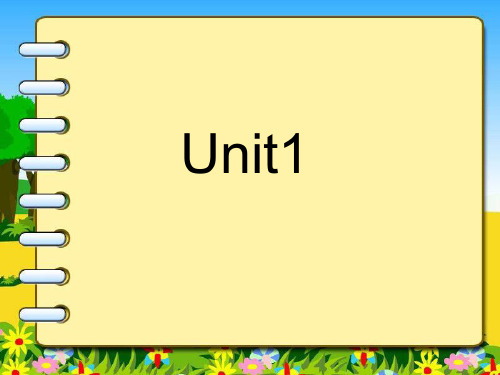
1. It rains. 1. It rained. 1. It snows. 1. It snowed.
2. It is rainy. 2. It was rainy. 2. It is snowy. 2. It was snowy.
注意以下几个词的复数变化:
leaf -- leaves 树叶 thief -- thieves 小偷 scarf -- scarves/scarfs 围巾 knife -- knives 刀
Showing the way 指路:
Go along this street/road, and then turn left/right at the …crossing. The…is on your left/right. You can’t miss it. To get there faster, you can take bus No.XX and get off at the …stop.
How far is it from here?
动词原形
want follow shout turn start am see steal run come tell
动词过去式
wanted followed shouted turned started was saw stole ran came told
-Is she taller than him?
-Yes, she is. /No, she isn’t.
注意: Who’s 和 Whose的区别 谁是 谁的
-Who’s taller than David? -Gao Shan is. -Whose school bag is heavier, yours or mine? -Yours is, I think.
上海版牛津英语六年级下册6B重点知识点复习整理

上海版牛津英语六年级下册6B 重点知识点复习整理Module 1 City LifeUnit 1 Great cities in Asia【知识点梳理】1.方位词: east / west / north / south / north-east / north-west / south-east / south-west用法: a. 两地不相邻 : e.g. A is north B.(=to the south of)b.两地接壤 : e.g. A is on the north of B.c.所属关系, A 包含 B, B 属于 A: e.g. B is in the north of A.2.by + 交通工具表示“乘 ,, 交通工具” , 用 how 进行提问e.g. by bus / ferry / train / ship / underground by plane = by air,⋯by ship = by sea3.How far ⋯多远(询问距离的远近,路程的长短)e.g. Hoe far is it from your home to school? 从你家到学校有多远?4.How long ⋯多长,多久(询问时间的长短,提问一段时间)e.g. How long does it take to travel from Shanghai to Beijing by train?坐火车从上海到北京要花多长时间?5. It takes (sb.) some time to do sth.做某事需要花费多少时间e.g. It takes me five hours to make this modal plane.做这个模型飞机花了我 5 个小时。
6.like / love / enjoy doing sth. 喜欢做某事e.g. The people in Bangkok like / love / enjoy eating spicy food. 曼谷人喜欢吃辛辣食物。
牛津译林版六年级英语下册6B U1-U3单元重点知识总结
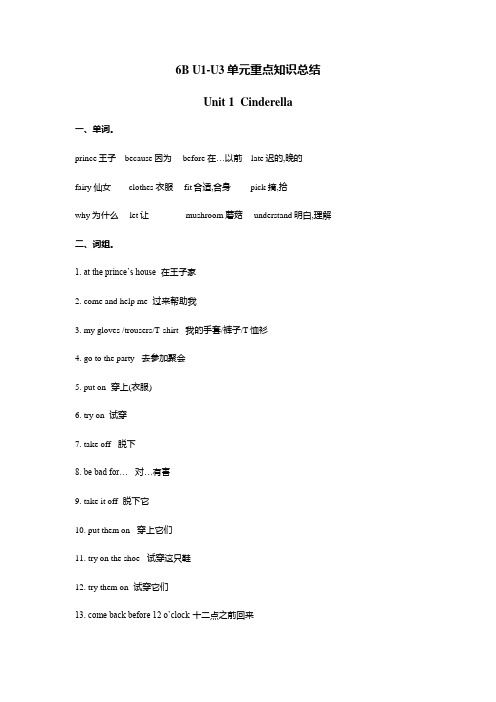
6B U1-U3单元重点知识总结Unit 1 Cinderella一、单词。
prince王子 because因为 before 在…以前 late迟的,晚的fairy 仙女 clothes 衣服 fit合适,合身 pick 摘,拾why 为什么 let让 mushroom 蘑菇 understand明白,理解二、词组。
1. at the prince’s house -在王子家2. come and help me -过来帮助我3. my gloves /trousers/T-shirt -我的手套/裤子/T恤衫4. go to the party -去参加聚会5. put on -穿上(衣服)6. try on -试穿7. take off -脱下8. be bad for… -对…有害9. take it off -脱下它10. put them on -穿上它们11. try on the shoe -试穿这只鞋12. try them on -试穿它们13. come back before 12 o’clock-十二点之前回来14. be sad /happy -伤心/开心15. have a good/great time -玩得开心16. at the party -在聚会上17. have to do sth. -不得不做某事18. have to come home -不得不回家19. visit every house -拜访每一户20. fit sb well -很适合某人21. at 12 o’clock -在十二点22. put on the English play -表演(演出)这个英语剧23. have a drink -喝饮料24. draw a dress for her friend -为她的朋友画一件连衣裙25. read stories -读故事26. have some snacks -有一些零食27. at a snack bar -在零食店28. thirsty and hungry Bobby -饥渴交加的波比29. in the forest -在森林里30. find some mushrooms -发现一些蘑菇31. under the tree -在树下32. pick a big red mushroom -摘了一个又大又红的蘑菇33. pick up the book =pick the book up-捡起这本书34. pick them up -把它们捡起来35. leave a shoe behind -把一只鞋子留下了36. don’t understand why -不明白为什么37. foot hurts -脚疼38. be bad /good for… -对…有坏处/好处39. have to -不得不,必须40. leave…behind -留下;丢下41. have some nice clothes and shoes -有些漂亮衣服和鞋子42. don’t have any nice clothes or shoes -没有漂亮衣服和鞋子43. put on the new clothes= put the new clothes on-穿上新衣服44. take off his white jacket=take his white jacket off -脱下他白色的夹克衫三、句型。
6B词组

牛津小学英语6B词组总汇Unit 1 Who is younger1.on Sunday morning 在周日早上2.go for a walk 去散步3.his cousin 他的表弟4.sit down under a big tree 坐在一棵大树下5.have a chat 聊天6.my classmate 我的同班同学7.a twin sister 一个双胞胎姐妹8.look the same 看起来一样9.be as tall as 和…一样高10.be taller than 比…高11.twenty minutes younger than me 比我小20分钟12.one day 一天13.the only child in one’s family 家里的独生子14.have got a brother 有一个弟弟15.one’s family photo全家福16.the man in black 穿着黑衣服的男士17.be the goalkeeper 做守门员18.thirteen years old 13岁19.165 centimetres 165厘米20.Try again! 再试一次!21.the tall girl in the yellow T-shirt 穿着黄色T恤的高女孩22.grow tall 长高Unit 2 More exercise1.be good at 擅长于…3.do not know how 不知道怎样做4.talk to sb. about sth. 与某人谈论某事5.need help with …需要帮助6.run faster than sb. 比某人跑得快7.run as fast as sb. 和某人跑得一样快8.a good football player 一个出色的足球运动员9.jump very high 跳得很高10.jump higher than sb. 比某人跳得高11.some of the boys in my class 我们班的一些男生12.swim faster than sb. 比某人游得快13.Don’t worry. 别担心14.do more exercise 做更多运动15.get stronger 变得更强壮16.do better in …做的更好17.get up earlier 起得更早18.That’s a good idea. 那是一个好主意。
牛津小学英语6B第三单元知识点整理与练习
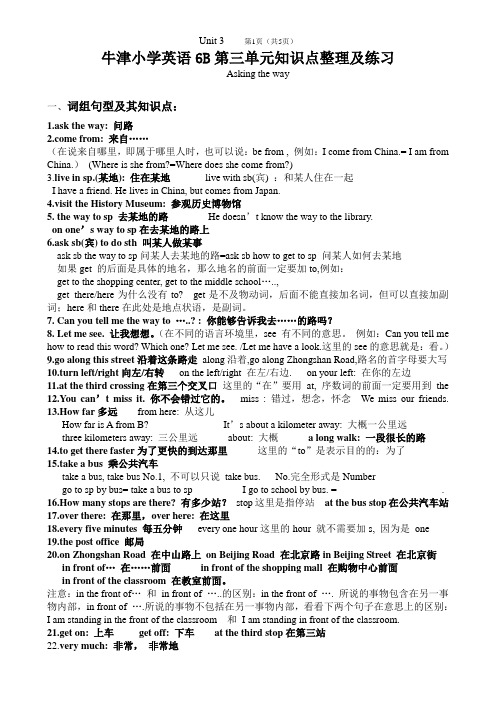
牛津小学英语6B第三单元知识点整理及练习Asking the way一、词组句型及其知识点:1.ask the way: 问路e from: 来自……(在说来自哪里,即属于哪里人时,也可以说:be from , 例如:I come from China.= I am from China.)(Where is she from?=Where does she come from?)3.live in sp.(某地): 住在某地live with sb(宾) :和某人住在一起I have a friend. He lives in China, but comes from Japan.4.visit the History Museum: 参观历史博物馆5. the way to sp 去某地的路He doesn’t know the way to the library.on one’s way to sp在去某地的路上6.ask sb(宾) to do sth 叫某人做某事ask sb the way to sp问某人去某地的路=ask sb how to get to sp 问某人如何去某地如果get 的后面是具体的地名,那么地名的前面一定要加to,例如:get to the shopping center, get to the middle school…..,get there/here为什么没有to?__get是不及物动词,后面不能直接加名词,但可以直接加副词;here和there在此处是地点状语,是副词。
7. Can you tell me the way to …..? : 你能够告诉我去……的路吗?8. Let me see. 让我想想。
(在不同的语言环境里,see 有不同的意思。
例如:Can you tell me how to read this word? Which one? Let me see. /Let me have a look.这里的see的意思就是:看。
(完整word版)小学牛津英语译林版6B英语知识点

(完整word版)小学牛津英语译林版6B英语知识点Unit1 The lion and the mousemouse复数老鼠mice 鼠标mousesbig,large区不large:常指面积或范围大,有广大和众多的含义,其反义词是small。
large 比较正式。
big:常指程度,规模,容积,分量,数量大,含有庞大、笨重的意思,还可表示“伟大,重要”之意,其反义词是little,big较为口语化wake up:up是副词,别可后接代词,代词放中间,名称中间后面都能够放。
the next day 翌日,是指某个特定时刻的后一天,既可指过去,也可指未来tomorrow是指从今天向后的一天,即改日some day 表示未来别确定的某一天,表示未来的时刻状语,所以时态用普通未来时just then 就在那时,表示过去的时刻状语,所以时态用普通过去时from then on 从那时起,表示过去的时刻状语,所以时态用普通过去时from now on 从今以后,表示未来的时刻状语,所以时态用普通未来时副词接在动词后面speak loudly形容词接在名词前面或be动词后面作表语the old manwalk by走过路过let...go 释放敞开pour...into把......倒入in the forest 在森林里large and strong又大又壮so small and weak 那么小和弱let sb. do 让某人干某事well done 干得好get out from the net破网而出become friends变成朋友cheer for...为...而欢呼be good at ...=do well in...擅长in the ground在地上in the hole在洞里look sad看起来伤感with his teeth 用他的牙齿catch(caught)...with用...捉住...have an idea有一具主意(想法)have a good(bad) idea 反义词strong 与weak(同音词week) bite过去式bit hit过去式hitunit2 good habits宾语补脚语:英语中,有点及物动词后接宾语时,还需要加一具词或短语来补充讲明宾语的事情,如此的词或短语叫做宾语补脚语。
- 1、下载文档前请自行甄别文档内容的完整性,平台不提供额外的编辑、内容补充、找答案等附加服务。
- 2、"仅部分预览"的文档,不可在线预览部分如存在完整性等问题,可反馈申请退款(可完整预览的文档不适用该条件!)。
- 3、如文档侵犯您的权益,请联系客服反馈,我们会尽快为您处理(人工客服工作时间:9:00-18:30)。
(6B)Unit 1Who is younger?一、单词:**** than 比,chat聊天,young年轻的old年老的strong 强壮的 fat 胖的 thin 瘦的 heavy 重的light 轻的short短的、矮的long 长的tall高的small小的big大的sit(sat)坐meet(met)遇见、见面***twin (双胞胎)之一as 作为minute 分钟only惟一的、仅有的child孩子(children孩子们)little小的cute 伶俐的、可爱的also 也**centimetre 厘米height身高weight体重 worm蠕虫二、词组:1.on Sunday morning 在星期天早晨2.go for a walk 去散步3. look the same 看起来一样4. one day 某一天5.as tall as 与…..一样高 as fat as 与…..一样胖as long as 与….一样长6. shorter than… 比….矮bigger than比…大heavier than比…重7. twenty minutes younger小二十分钟8.one year older 大一岁9.sit down under a big tree 坐在大树下10.be glad to do 非常高兴做某事11.see them/him/you 看见他们/他/你12.look different 看起来不同13.a twin sister 双胞胎姐妹14.my classmate/deskmate我的同班同学/同桌15.how old 多大 16.the only child 仅有的一个孩子17.a cute little dog一只可爱的小狗18.get a brother 得了个弟弟19.a tall boy 一个高个子的男孩20.a young teacher 一位年轻的教师21.some heavy boxes 一些重的盒子22.whose classroom 谁的教室23.your old friend(s) 你的老朋友24.a heavy schoolbag 一只重的书包25.a strong goalkeeper 一个强壮的守门员26.brothers and sisters 兄弟姐妹27.the girl in red 穿红衣服的女孩28.yours or mine 你的还是我的29.look young 看起来年轻30.have a chat 聊天、闲谈31.asksome queations问一些问题三、形容词比较级:A.直接加er/rtall---________light----________young--_________old---________strong--___small--_________late---_________long---_________short--________B.双写加er big-------_________ fat-----_________ thin---________C.去y改i加er heavy---_________四、句型:1、Who’s younger than him ? 谁比他年轻?My brother is younger than him . 我弟弟比他年轻。
2、Are you as tall as Tom ? 你和汤姆一样高吗?3、Do you have any brothers or sisters?Yes,I do .No,I don't. I have a brother./I have a sister.4、Whose schoolbag is heavier,yours or mine ?Mine is./My schoolbag is heavier than yours .五、音标:or / / word workbook world worm work workerir / / shirt skirt girl bird birthday first third thirtyur / / turn nurse surfUnit 2More exercise一、单词****low低 high高 slow慢 fast快 late晚 early早 far远 well好/语气词bad糟糕的、坏的true 正确的fish鱼(goldfish金鱼)***exercise练习matter事件problem问题player运动员,演员 worry担心idea主意jog慢跑will将**traffic 交通二、词组:1. be good at 擅长2.do well in 擅长(do better in 更擅长)3.do more exercise做更多的锻炼4.as strong as 和…一样强壮5.the other children 其他的孩子6.want to do better 想做得更好7.What’s the matter?怎么啦? 8.well done 做得不错、干得好9.run faster than me 跑得比我快10.run as fast as him 跑得和他一样快11.a good football player一个好的足球运动员12.jump very high跳得很高13.do other things better than your classmates做其他事情比你的同班同学好14.jump higher than 跳得比…高15.That’s true.对的。
16.some of the boys 某些男孩17.Don’t worry.别担心。
18.get stronger变得更强壮19.a good idea一个好主意20.jog to school慢跑去学校21.play ball games玩球类运动22.read better than all of us 读得比我们所有人好23.want to do=would like to do想要做...24.read the new words for the class为全班同学读生词25.get up earlier 更早的起床26.every day 每天27. after school 放学后28.start our lesson 开始上课29.all the other children 所有其他的孩子三、副词比较级(用于行为动词后面):直接加er/r:low-_______slow-_______high-________ fast-______late-______去y改i加er:early-earlier不规则变化:far-farther, well(good)-better , much/many-more bad-worse四、句型:I get up early than you.我起床比你起得早。
Ben runs faster than Jim.本跑得比吉姆快。
Do the boys jump higher than the girls? Yes, they do.男生们跳得比女生们高吗?是的。
Does Jim swim slower than David? 吉姆游得比大卫慢吗?No, he doesn’t. David swims slower than Jim.不,大卫游得比吉姆慢。
I’m goo d at Chinese.=I do well in Chinese.我擅长语文。
(I am not good at Chinese.=I don’t do well in Chinese.)Jim is good at English. =Jim does well in English.吉姆擅长英语。
(Jim isn’t good at English.=Jim doesn’t do well in Chinese.)Jim is not as strong as the other boys. 吉姆不如其他男生强壮。
Mike runs as fast as Ben.迈克跑得和本一样快。
I think you do other things better than your classmates.我认为你做其他事情比你同班同学好。
The traffic was heavier than yesterday.交通比昨天拥挤。
五、音标:or / / forty horse morning sports for shortUnit 3 Asking the way一、单词:****get到达way路away离开along沿着street大街crossing交叉路口stop停车站miss找不到、错过walk路程post office邮局bookshop书店(shoeshop鞋店toyshop玩具店fruitshop 水果店)run-ran跑catch-caught抓tell-told告诉***kilometre千米、公里history museum历史博物馆city城市shopping centre购物中心middle school中学primary school小学No.=number第…号train station火车站bus station汽车站road街道、路**suddenly突然steal(stole)偷out of在…外shout大声喊叫thief小偷bank银行hotel宾馆place地方river河二、词组:e from 来自于……2.live in China 住在中国3.on holiday 度假4. get there 到达那里5.get to your home到你的家6.go to the city post office 去市邮局7.tell me the way to 告诉我去……的路8.let me see 让我想想9.go along this street 沿着这条街走10.turn right / left 向右/ 左转11.at the third crossing 在第三个十字路口12.on your left 在你的左边13.you can’t miss it .你不要错过。
14.how far 多远15.a kilometre away 一公里远16.a long/short walk 一段很长/短的路17.take bus No. 5 乘5路车18.how many stops 多少站19.at the bus stop 公共汽车站20.every five minutes 每隔五分钟21.on River Road 在大江路22.in Shanghai Street 在上海街23.get on 上车24.get off at the third stop 在第三个车站下车25.You’re welcome. 不客气/不必谢。
